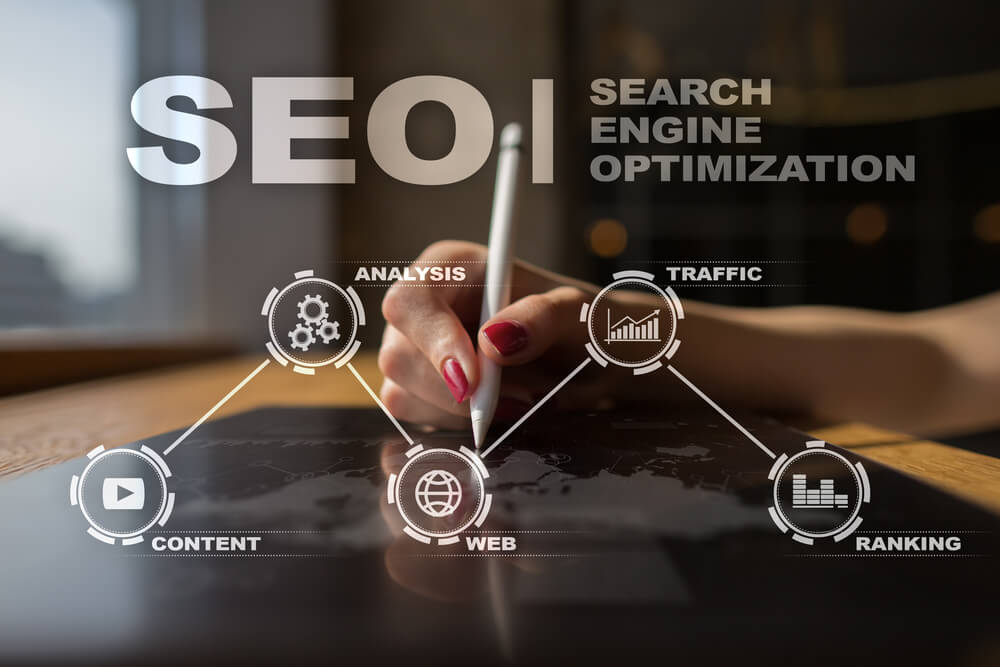What is SEO and How Does It Work?
SEO, also known as Search Engine Optimization, refers to the practice of optimizing a website to increase its visibility and ranking on search engine results pages (SERPs) for specific keywords or phrases. The goal of SEO is to drive organic (non-paid) traffic to a website, improving its online presence and attracting potential customers or users. It is a key part of your comprehensive marketing strategy as you grow your brand and seek the attention you need.
SEO can be a complicated process that may prove difficult to navigate. However, with the help of an experienced marketing partner, you can improve your search ranking and maximize your results.
Keyword Research
The process of search engine optimization starts with keyword research. You begin by identifying the terms of phrases people use when searching for products, services, or information related to your website's content.
These keywords are crucial since they will be the primary focus of your optimization efforts. You need to know what people are searching for, how often they use key terms, and where you rank compared to others in your industry.
On-Page Optimization
Once you have identified keywords that you need to focus on, you can begin the on-page optimization process, which creates and changes elements on your website to make it search engine-friendly. It includes:
- Title Tags: Creating unique and relevant titles for each page that include the keywords you need to target
- Meta Descriptions: Crafting compelling and informative descriptions for each page that contain the keywords you are focusing on
- Headings: Using proper heading tags (H1, H2, and so on) to structure your content and highlight key points. Proper headings break up the content and make it easier for search engines and readers to tell what it is about.
- URL Structure: Creating clean and descriptive URLs that incorporate keywords.
- Keyword Usage: Naturally incorporating your target keywords throughout the content, but without overstuffing (keyword stuffing can lead to penalties).
- Image Optimization: Optimizing image filenames and alt tags with appropriate keywords
On-page optimization is a key part of highlighting the keywords that each page focuses on and ensuring that search engines can easily view that content.
Off-Page Optimization
Some of the strategies you will use to improve overall SEO involve activities outside your website. You need to improve your site's authority and reputation in order to show search engines that you are a trusted authority in your field. Primarily, this means link building: the process of obtaining backlinks from other high-quality, relevant websites.
These backlinks stand as a "vote of confidence" for your site, letting search engines know that your content has value for readers.
Technical SEO
Simply using the right keywords in the right places may go a long way toward establishing your brand, but many of the features that build SEO occur on the technical end. That technical foundation is essential to improving your search ranking. Focus on factors like:
- Site speed, including loading time
- Mobile-friendliness
- A secure HTTPS connection
- XML sitemaps
- Proper use of canonical tags
With those elements in place, search engines will recognize a higher degree of authority in your site and reward you accordingly.
Content Creation
High-quality, relevant, and valuable content is the backbone of your SEO strategy. You need to provide content that actively addresses users' needs and interests: content that answers the questions they have come to your page to ask or provides them with the information they're seeking. This high-quality content helps attract organic traffic and earn natural backlinks, all of which work together to raise your search ranking over time.
User Experience
Search engines highly prioritize user experience. Some factors, like page load speed, mobile responsiveness, and ease of navigation, are easy for search engines to measure.
Search engines will also track how long searchers spend on your website after their search, which shows how valuable and useful your site is for those users.
Search Engine Crawling and Indexing
Search engines use automated bots (crawlers) to browse the internet and discover new or updated content.
Once crawled, the content is indexed, which means it's added to the search engine's database and can appear in search results. Updating your site regularly can help keep it relevant and improve your search ranking.
Algorithm Updates
Search engines, including Google, continuously update their algorithms to improve search results and combat spammy tactics. Each update slightly changes the strategies used to determine top search ranking. Staying informed about these updates can help you maintain your website's ranking and raise your overall authority.
Get Help Boosting Your SEO
SEO is an ongoing process: one that your business must attend to on a regular basis. Achieving and maintaining high rankings requires consistent effort, monitoring, and adaptation to changing trends and algorithms. It’s essential to focus on providing valuable content to users while adhering to SEO best practices to enhance your website's visibility and attract organic traffic from search engines.
Mid-West Family Southwest Michigan can be the hero of SEO for your website along with our own website company, Webstix. Contact us today to learn more about how we can help you obtain and maintain those essential search engine rankings.



